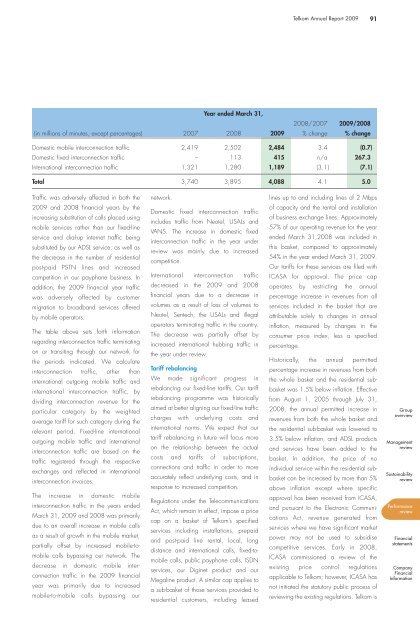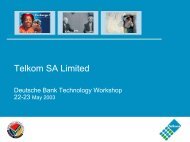Telkom AR front.qxp
Telkom AR front.qxp
Telkom AR front.qxp
You also want an ePaper? Increase the reach of your titles
YUMPU automatically turns print PDFs into web optimized ePapers that Google loves.
Traffic was adversely affected in both the<br />
2009 and 2008 financial years by the<br />
increasing substitution of calls placed using<br />
mobile services rather than our fixed-line<br />
service and dial-up internet traffic being<br />
substituted by our ADSL service, as well as<br />
the decrease in the number of residential<br />
post-paid PSTN lines and increased<br />
competition in our payphone business. In<br />
addition, the 2009 financial year traffic<br />
was adversely affected by customer<br />
migration to broadband services offered<br />
by mobile operators.<br />
The table above sets forth information<br />
regarding interconnection traffic terminating<br />
on or transiting through our network for<br />
the periods indicated. We calculate<br />
interconnection traffic, other than<br />
international outgoing mobile traffic and<br />
international interconnection traffic, by<br />
dividing interconnection revenue for the<br />
particular category by the weighted<br />
average tariff for such category during the<br />
relevant period. Fixed-line international<br />
outgoing mobile traffic and international<br />
interconnection traffic are based on the<br />
traffic registered through the respective<br />
exchanges and reflected in international<br />
interconnection invoices.<br />
The increase in domestic mobile<br />
interconnection traffic in the years ended<br />
March 31, 2009 and 2008 was primarily<br />
due to an overall increase in mobile calls<br />
as a result of growth in the mobile market,<br />
partially offset by increased mobile-tomobile<br />
calls bypassing our network. The<br />
decrease in domestic mobile interconnection<br />
traffic in the 2009 financial<br />
year was primarily due to increased<br />
mobile-to-mobile calls bypassing our<br />
network.<br />
Domestic fixed interconnection traffic<br />
includes traffic from Neotel, USALs and<br />
VANS. The increase in domestic fixed<br />
interconnection traffic in the year under<br />
review was mainly due to increased<br />
competition.<br />
International interconnection traffic<br />
decreased in the 2009 and 2008<br />
financial years due to a decrease in<br />
volumes as a result of loss of volumes to<br />
Neotel, Sentech, the USALs and illegal<br />
operators terminating traffic in the country.<br />
The decrease was partially offset by<br />
increased international hubbing traffic in<br />
the year under review.<br />
Tariff rebalancing<br />
We made significant progress in<br />
rebalancing our fixed-line tariffs. Our tariff<br />
rebalancing programme was historically<br />
aimed at better aligning our fixed-line traffic<br />
charges with underlying costs and<br />
international norms. We expect that our<br />
tariff rebalancing in future will focus more<br />
on the relationship between the actual<br />
costs and tariffs of subscriptions,<br />
connections and traffic in order to more<br />
accurately reflect underlying costs, and in<br />
response to increased competition.<br />
Regulations under the Telecommunications<br />
Act, which remain in effect, impose a price<br />
cap on a basket of <strong>Telkom</strong>’s specified<br />
services including installations, prepaid<br />
and post-paid line rental, local, long<br />
distance and international calls, fixed-tomobile<br />
calls, public payphone calls, ISDN<br />
services, our Diginet product and our<br />
Megaline product. A similar cap applies to<br />
a sub-basket of those services provided to<br />
residential customers, including leased<br />
<strong>Telkom</strong> Annual Report 2009 91<br />
Year ended March 31,<br />
2008/2007 2009/2008<br />
(in millions of minutes, except percentages) 2007 2008 2009 % change % change<br />
Domestic mobile interconnection traffic 2,419 2,502 2,484 3.4 (0.7)<br />
Domestic fixed interconnection traffic – 113 415 n/a 267.3<br />
International interconnection traffic 1,321 1,280 1,189 (3.1) (7.1)<br />
Total 3,740 3,895 4,088 4.1 5.0<br />
lines up to and including lines of 2 Mbps<br />
of capacity and the rental and installation<br />
of business exchange lines. Approximately<br />
57% of our operating revenue for the year<br />
ended March 31,2008 was included in<br />
this basket, compared to approximately<br />
54% in the year ended March 31, 2009.<br />
Our tariffs for these services are filed with<br />
ICASA for approval. The price cap<br />
operates by restricting the annual<br />
percentage increase in revenues from all<br />
services included in the basket that are<br />
attributable solely to changes in annual<br />
inflation, measured by changes in the<br />
consumer price index, less a specified<br />
percentage.<br />
Historically, the annual permitted<br />
percentage increase in revenues from both<br />
the whole basket and the residential subbasket<br />
was 1.5% below inflation. Effective<br />
from August 1, 2005 through July 31,<br />
2008, the annual permitted increase in<br />
revenues from both the whole basket and<br />
the residential sub-basket was lowered to<br />
3.5% below inflation, and ADSL products<br />
and services have been added to the<br />
basket. In addition, the price of no<br />
individual service within the residential subbasket<br />
can be increased by more than 5%<br />
above inflation except where specific<br />
approval has been received from ICASA,<br />
and pursuant to the Electronic Communications<br />
Act, revenue generated from<br />
services where we have significant market<br />
power may not be used to subsidise<br />
competitive services. Early in 2008,<br />
ICASA commissioned a review of the<br />
existing price control regulations<br />
applicable to <strong>Telkom</strong>; however, ICASA has<br />
not initiated the statutory public process of<br />
reviewing the existing regulations. <strong>Telkom</strong> is<br />
Group<br />
overview<br />
Management<br />
review<br />
Sustainability<br />
review<br />
Performance<br />
review<br />
Financial<br />
statements<br />
Company<br />
Financial<br />
Information




